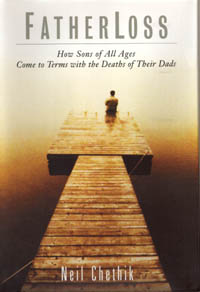

Reader's Guide For FatherLoss
FatherLoss has been used successfully by men's groups, grief groups, and mixed-gender reading groups to stimulate discussion of how any person deals with significant losses in their lives, and particularly how the death of a father impacts his surviving sons. Some readers who are not members of a reading group may find it helpful to answer the questions on their own, perhaps in writing or in one-on-one conversations with a friend, spouse, clergy-person or therapist.
Discussion Questions
According to the survey conducted for FatherLoss, more than 60 percent of sons say that at the time their father died, the death affected them more than any previous one.
What loss has affected you more than any other?
Explain the circumstances of that loss, and how you reacted to it both in the short- and long-term.
What is your first memory of your father?
When you were a kid, what did your father look like, sound like, smell like?
Describe an incident in your childhood in which you felt very close to your dad? Describe an instance in which you felt distant from or angry with him?
What do you remember about how your father dealt with losses in his life?
Did you ever see him cry?
If your father was alive into your adulthood, how was your adult relationship with him different than that in your childhood?
Did you get closer, more distant?
Were there particular incidents with your father that helped you feel more adult, perhaps an equal to him?
If so, what happened, and how old were you?
Did you father ever say he was proud of you, or express his respect for you in any other way?
What do you still want from your father today?
If your father has died, what preparations did you make (or do you wish you had made) to help you deal with his death?
If your father is alive, what preparations, if any, are you now making for dealing with his eventual death?
What is your history regarding crying?
Do you recall messages in your childhood warning you against crying?
Did you stop crying for a period in your life?
How often do you cry in your adulthood?
What is most likely to bring you to tears?
How do you feel during and after an episode of crying: embarrassed, angry, happy?
Do you think there's something wrong with you if you don't cry over a significant loss, or if you do?
If your father has died, did you see his body after the death?
Did you attend a memorial service or other death rite for him?
Did you participate in his memorial service?
How did death rituals help or not help as you dealt with the death?
Chapter 7 describes four styles of mourners: Dashers, Delayers, Displayers, Doers. Which of these styles best describes the way you deal with losses in your life?
Are you satisfied with the way you deal with loss?
If not, what would you like to change?
What can others do, if anything, to help comfort you as you deal with a loss?
Do you like to be left alone?
Do you like to be kept company?
How long does it usually take you to come to terms with an important loss?
How do you know when you've recovered?
Have you ever sought professional help, from a therapist, clergy-person or similar professional, to deal with a death?
If so, what did the professional do to help you the most?
What was least helpful?
If you've never sought help for a loss, why not?
After the death of your father (or, if your father is alive, after the death of another loved one), did you do things to intentionally connect with the memory of the deceased?
Did you look through his mementoes, work in his garden, play an instrument he used to play, etc.?
Do you ever dream about deceased people from your life?
Do books, movies, or other media sometimes trigger emotional memories of the deceased?
Do family events, such as weddings, the birth of children, and funerals, sometimes trigger strong memories of a lost loved one?
If you are a parent, what did you learn from your father about parenting?
In what ways are you affectionate with your children?
Have you ever told them that you're proud of them?
Have you done anything that might help your children deal with your eventual death? Have you said all you need to say to your children before your death?
Check out more of FatherLoss

